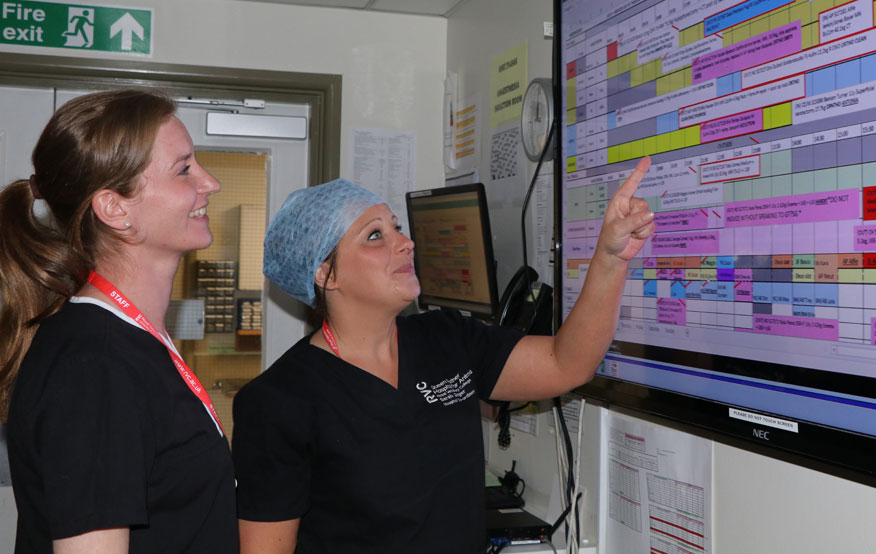Coordinating a Large Teaching Hospital
Clinical Connections – Autumn 2017
Interview with Georgina Tyrrell, Hospital Coordination Team Leader
Q: What is the role of a Hospital Co-ordinator?
A: In June, RVC Small Animal Referrals established the new Hospital Co-ordination Team, comprising of myself and Sarah Ginger. We are responsible for co-ordinating the throughput of patients and procedures within the Queen Mother Hospital for Animals (QMHA). We track each patient’s journey from admission to theatre and are responsible for organising, scheduling and co-ordinating procedures into the relevant diagnostic imaging rooms, endoscopy suite and theatres, and assigning members of the anaesthesia team to cases. We also work closely with ward nurses to ensure kennel occupancy levels are acceptable for the flow of patients.
Q: Why has the RVC decided to make this change?
A: We are always striving to improve – and driving this change is animal well-being. Staff are encouraged to suggest improvements and we also look at other medical environments for inspiration. This development enables us to react faster to constantly changing situations and priorities.
Q: What do you think the impact of this new set up is on patients?
A: We are having a positive impact on patients through a reduction in waiting times between procedures. Just like humans in hospital, animals can get stressed if they have to wait – especially in unfamiliar environments. Referring vets can feel confident we are committed to giving their clients a fast and efficient service.
Q: What is a typical day for you?
A: Our hours are 7am-7pm Monday to Friday. Having a Hospital Co-ordinator on site for 12 hours a day helps us to plan for the next day. Each morning we look at the transfer board from Emergency and Critical Care to see which cases admitted overnight may need surgery or imaging. We check wards, ensuring kennel occupancy levels are suitable for the day ahead. Then we go to the procedure scheduling board where we book requested procedures, allocate rooms or theatres and help coordinate students and anaesthetists, ensuring that everyone is ready when the patient arrives. At the end of each day we collate data for our efficiency audits to help us identify areas where we can make further improvements.
Q: What do you enjoy most about your job?
A: I enjoy troubleshooting and that every day is very different. The role is dynamic and varies from scheduling in emergencies to looking at how we can improve even further.
Q: What are your qualifications?
A: Sarah and I are both RVNs. Having a veterinary nursing qualification and experience is invaluable to be able to know the lengths of procedures and the equipment that may be needed.
I graduated from the RVC in 2012 with a BSc (Hons) in Veterinary Nursing. I spent a few years gaining experience in general practice and later returned to the RVC as a Surgery Nurse. I left the QMHA in 2015 to become a Head Nurse in general practice but couldn’t resist returning this year to lead the new Hospital Coordination Team. Sarah started her career in veterinary nursing nine years ago, registering in 2013, and has a wealth of experience ranging from Head Nurse to training as a nutritional consultant, where she gave advice to practices and the public. Sarah is passionate about all our patients and has a great fondness for cats. She has a Certificate in Feline Nursing and is working towards a Diploma in Feline Nursing.

Q: What skills would a RVN need who wants to develop their career in this area?
A: The Hospital Coordinator role is very different to hands-on nursing but provides an opportunity for veterinary nurses to develop other skills. The role requires good organisation, communication and negotiation skills, along with being able to work under pressure.
Q: How do you see the new service developing?
A: We foresee that in time the service will expand as the hospital continues to grow and evolve. We aim to constantly improve efficiency so that the clinicians can treat more patients. By us ensuring that the hospital maintains and continues to improve its high level of efficiency, patients will continue to receive outstanding care, with faster patient flow.
Sign up to get Clinical Connections in your inbox rvc.ac.uk/clinical-connections
